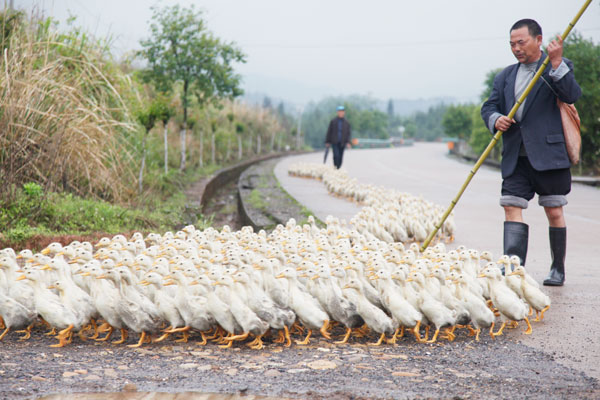Experts' findings point to bird flu prevention path
Genetic studies by Chinese scientists may have set a new direction for the prevention and treatment of avian flu.
Li Ning, a member of the Chinese Academy of Engineering and a professor at China Agricultural University, together with his colleagues, published the sequence for the duck genome in the journal Nature Genetics on Monday.
The work identifies potential genetic factors influencing how ducks respond to avian influenza, according to a news release from the journal.
 |
|
A farmer guides a flock of ducks in Changshan, Zhejiang province. Scientists have identified aspects of the genome sequence of ducks that will help in the battle against bird flu. PROVIDED TO CHINA DAILY |
"Ducks are like the natural reservoir of avian flu viruses," Li said, explaining that ducks could be affected by more different strains of bird flu than any other animal.
Avian influenza can affect many animals, even pandas, but most animals are only vulnerable to several strains. However, ducks can harbor 14 out of the 16 known hemagglutinin and all nine neuraminidase subtypes, Li said.
What has aroused scientists' interest in researching ducks is that despite their vulnerability to bird flu, ducks have strong immune systems that protect them from being killed by the flu.
After sequencing the whole genome of a 10-week-old female Beijing duck and comparing it with the genome sequences of other birds and mammals, the team found that the duck has fewer immune-related genes than mammals. Ducks also have a specific gene that responds to avian influenza.
"That means ducks survive avian influenza not because they have more immune genes, but because they have special genes that resist the virus," Li said.
Li's team examined the genetic expression of an H5N1-infected duck and found the genes. The reason that the team chose H5N1 in the experiment is that H5N1 has a higher mortality rate than other avian influenza viruses, including the H7N9 strain that recently surfaced.
"The duck-specific expansion and anti-viral activities of defensive genes are the most important discovery," said Liu Jinhua, a professor specializing in animal medicine at China Agricultural University.
Liu said scientists are using a vaccine to control the spread of bird flu among chickens, but since there is so much variation, vaccines sometimes do not work well.
"But if we can choose some chickens that are genetically resistant to bird flu, the effect would be better than a vaccine. The work of Li and his team sets a new scientific goal for breeding," he said.
However, Li has higher expectations for the research.
"Besides breeding, the research will also offer possibilities for new methods to cure bird flu," he said.
One example is that interferon-induced protein with tetratricopeptide repeats was proved to be useful in resisting bird flu viruses.
"Maybe in the future, some new drugs would be developed to prevent both people and birds from dying of bird flu," he said.





















